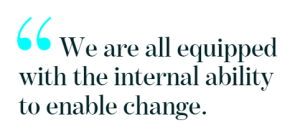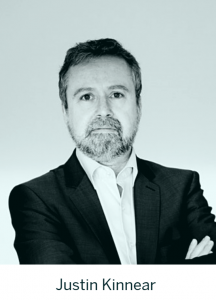In a world where near-constant change is the new normal, HPC’s Justin Kinnear explores how a courageous and curious mindset helps to unlock our in-built change capabilities.
Reflecting recently with a group of leaders on their experiences with change, some leaders declared themselves to be ‘good at change’ while others were not so positively disposed. Is it true? Are some of us “good at change” while others are not so lucky? Reassuringly, we are all equipped with the internal ability to enable change and now is the time to embrace and unlock these capabilities.
Your past is your destiny
Many of us were exposed as children to stories of the family business, where a founder grandparent passed down the reins to a child, who in turn did the same for their child. Some of these stories are humble while others are more noble and glorious, such as a line of ancestors in the military or at the top of sport. Without trying, many of us may have formed notions that, in some way, our destinies were set by the acts of our forebears. Previous generations brought up in turbulent times tended to emphasise the importance of stability, certainty, and being in control of one’s path through life. Growing up in an environment that suggested the family business or skillset was in one’s future, coupled with strong messages not to stray too far from previous successes, all helped to create conditions that suited low-risk, low-ambition thinking in many people.
I might change if you will help me
The world of course has changed, at first slowly but then more rapidly. Technology alone has changed every workplace and home through personal computers, internet, mobile phones, and recently AI. Margaret Heffernan noted in her book Uncharted that while humans don’t like change, favouring stability and routine, we are very good at change when it is demanded of us. However, our willingness to step towards change depends enormously on our feeling of psychological safety. The extent to which we think we will be supported and encouraged as we try something new matters greatly. Sadly, this is not always the case, and some of our change experiences have been poorly supported and have caused some of us to develop a deep-seated fear of change.
It’s how I’m made
Curiously as newer insights into the functioning of the human brain are revealed, we have come to discover that our brains are already positively disposed towards change. The amazing concept of neuroplasticity described by Norman Doidge, showed us how brains may create new neural pathways where existing pathways suffered damage. The spectacular work of Lisa Feldman Barrett explains how our brains are busy all night planning how to deploy emotional and energy resources tomorrow in a massive predictive effort. When those predictions go wrong our brains learn from the experience to do better next time, all without much conscious input from us as humans.
Environment still matters
In her seminal work on mindsets, Carol Dweck reminded us that how we choose to respond to the world we experience has a huge bearing on how open we are to change. Given how necessary change is, one could be forgiven for assuming everyone would just step toward change. Dweck’s work showed us that some of us are powerfully convinced that we can’t change and that we are indeed limited by what we have today. To fully engage the power of our change-oriented brains, we must revisit our beliefs about ourselves. We must make conscious decisions to learn, to fail, and to understand that all growth requires us to step into unknown spaces and engage with new experiences. An open-to-change mindset can thankfully be cultivated over time and will allow each person to be at their very best as they move toward the next change experience.

New era, new change expectations
 When Bob Dylan released “The Times They Are A-Changin’” in 1964 it no doubt resonated with people who could see change happening all around them. History since then has taught us that every generation feels like this. Things are changing faster than ever before, and while we would like to stop all the change for a little while to draw breath, this simply isn’t going to be possible. So, as we face ever faster and more dramatic changes in our lives at work and home, we need to revisit our personal beliefs about change. While a yearning for stability and predictability is very human, not least because it tries to preserve scarce decisional resources, your brain is perfectly capable of learning, evolving, presenting you with decision options, and weighing risk. We can’t expect the level of change to lessen, so we must embrace the need for continuous change and personal evolution.
When Bob Dylan released “The Times They Are A-Changin’” in 1964 it no doubt resonated with people who could see change happening all around them. History since then has taught us that every generation feels like this. Things are changing faster than ever before, and while we would like to stop all the change for a little while to draw breath, this simply isn’t going to be possible. So, as we face ever faster and more dramatic changes in our lives at work and home, we need to revisit our personal beliefs about change. While a yearning for stability and predictability is very human, not least because it tries to preserve scarce decisional resources, your brain is perfectly capable of learning, evolving, presenting you with decision options, and weighing risk. We can’t expect the level of change to lessen, so we must embrace the need for continuous change and personal evolution.
Which brings us to leaders
We know that individuals are more apt to move toward change when they feel psychologically safe, and this safety is created by those who lead us. We know our mindset shapes how we feel about change and personal growth. We also know our leaders play a big part in helping us understand our fears, beliefs, and self-efficacy profile. Most of all, we watch what others do when it comes to change. How they react to change matters. What they say about change matters. Nobody shapes our perspective on change more than the person we follow – the leaders in our organisations, communities, or families. Leaders show the way. Leaders set the tone. Leaders determine if change is good, necessary and exciting; will it generate possibilities; or if change is something else.
 We might not all feel the same way about an upcoming change. We may not all relish the challenge of crisis or discontinuity. We can all cope with these challenges, but only by letting go of the worn-out belief that we can’t change. Our brains are designed to adapt, but our minds often try to avoid the work. In a world where more change is certain, embrace your own in-built capability to learn, try, fail, and ultimately change.
We might not all feel the same way about an upcoming change. We may not all relish the challenge of crisis or discontinuity. We can all cope with these challenges, but only by letting go of the worn-out belief that we can’t change. Our brains are designed to adapt, but our minds often try to avoid the work. In a world where more change is certain, embrace your own in-built capability to learn, try, fail, and ultimately change.
Justin Kinnear – HPC

Justin is Head of Research at HPC and is at the forefront of creating blended content that is relevant, impactful and in line with the current needs of individuals and teams. Justin undertakes external research and analysis for leading L&D bodies and works in collaboration with our clients to evaluate the impact of HPC’s solutions within their organisations.
His passion for people development and his ability to inspire makes him a key member of HPC’s facilitation and coaching teams. His work with HPC focuses on the development of a high performance culture for our clients with a particular emphasis on accountability and feedback.
As well as his extensive research and facilitation experience, he was formerly Head of L&D at IBM and Britvic.
Connect with Justin on LinkedIn >>>
Connect with HPC on LinkedIn >>>